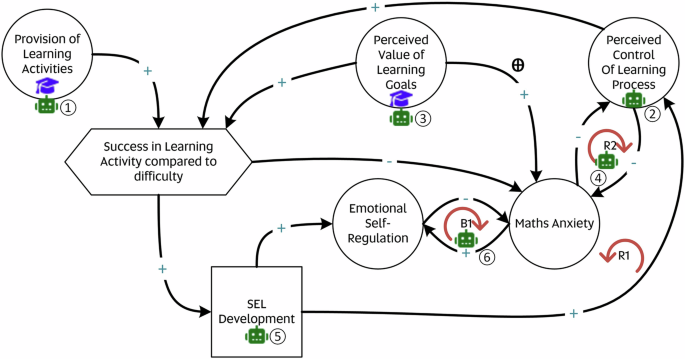The integration of artificial intelligence (AI) into educational frameworks presents a promising avenue for addressing socio-emotional challenges, such as mathematics anxiety. According to a recent article on Nature.com, AI technologies have the potential to enhance students' perceptions of competence, control, and value, thereby transforming traditional teacher-student interactions.
Potential Benefits and Transformative Impact
The article emphasizes the transformative potential of AI in education, particularly in shaping achievement emotions. By focusing on students' emotional experiences, AI can help mitigate anxiety and foster a more supportive learning environment. This approach not only aims to improve academic performance but also to enhance students' overall educational experience.
Research Agenda and Ethical Considerations
A comprehensive research agenda is advocated to explore AI's role in education further. This agenda underscores the importance of leveraging AI for meaningful and transformative learning experiences. However, it also highlights the need to address both the products and processes of education, ensuring that AI integration is ethical and beneficial for all stakeholders involved.
"AI technologies can significantly impact students' perceptions of their own competence, control, and value, thereby transforming teacher-student interactions," notes the article on Nature.com.
Risks and Regulatory Oversight
While the potential benefits of AI in education are substantial, they are accompanied by critical risks and ethical considerations. The integration of AI must be carefully managed to prevent unintended consequences, such as exacerbating existing inequalities or compromising student privacy. Additionally, regulatory oversight is essential to ensure that AI applications in education adhere to ethical standards and protect the interests of all learners.
Originally published at https://www.nature.com/articles/s41539-025-00315-4
ResearchWize Editorial Insight
The article on AI in education is crucial for students and researchers as it delves into the transformative potential of AI to address socio-emotional challenges like math anxiety. This is not just about improving academic performance but reshaping the educational experience to be more supportive and emotionally aware.
For researchers, the article highlights a pressing need for a comprehensive research agenda. This agenda should focus on how AI can create meaningful learning experiences while addressing ethical concerns. It raises critical questions about the balance between technological innovation and ethical responsibility.
Students stand to benefit significantly if AI can personalize learning and reduce anxiety. Yet, the article warns of potential risks, such as exacerbating inequalities or infringing on privacy. This underscores the importance of regulatory oversight to ensure AI applications are fair and secure.
Big-picture questions arise: How can AI be integrated without widening the educational divide? What are the long-term implications for teacher-student dynamics? As AI becomes more embedded in education, these questions will shape the future landscape of learning.
Looking Ahead
1. Curriculum Revolution AI education must undergo a revolution, not an evolution. Traditional curriculums are woefully inadequate for the pace of AI development. Educators must not only integrate AI tools but also teach students how to critically engage with AI systems. What happens when the curriculum fails to adapt? We risk breeding a generation ill-prepared for an AI-driven world.
2. Ethics at the Core Ethical AI isn't optional; it's imperative. Educational institutions need to prioritize ethics in AI development and deployment. How will students learn to navigate the moral complexities of AI if ethical considerations are an afterthought? Establish mandatory ethics modules in AI courses to ensure that students can weigh the societal implications of their work.
3. Teacher Training Overhaul Teachers are the linchpins of educational transformation. Yet, many are unequipped to leverage AI effectively. Comprehensive training programs are crucial. If we don't equip our educators with the right tools and knowledge, how can they guide the next generation? Let's invest in teacher training today to prepare for tomorrow.
4. Inclusive AI Development AI in education must be inclusive, catering to diverse learning needs. How can AI systems be designed to address, rather than exacerbate, existing educational disparities? We need AI models that are empathetic and adaptable, ensuring no student is left behind.
5. Regulatory Vigilance Regulators must keep pace with AI advancements. The risk of falling behind is real, and the stakes are high. Will regulatory frameworks evolve quickly enough to safeguard student data and privacy? Proactive regulatory measures are essential to protect learners and maintain trust in AI systems.
6. Continuous Feedback Loops Incorporate continuous feedback mechanisms to refine AI tools in education. Are we ready to embrace a culture of constant iteration and improvement? Engaging students, educators, and technologists in ongoing dialogue will ensure AI applications remain relevant and effective.
Originally reported by https://www.nature.com/articles/s41539-025-00315-4.
Related Articles
- Mapping the use of artificial intelligence in medical education: a scoping review
- Google DeepMind research scientist: The way young people are using AI is disappointing, they need to…
- Nordic Region sets out direction for AI – with education and research at the forefront
📌 Take the Next Step with ResearchWize
Want to supercharge your studying with AI? Install the ResearchWize browser extension today and unlock powerful tools for summaries, citations, and research organization.
Not sure yet? Learn more about how ResearchWize helps students succeed.

